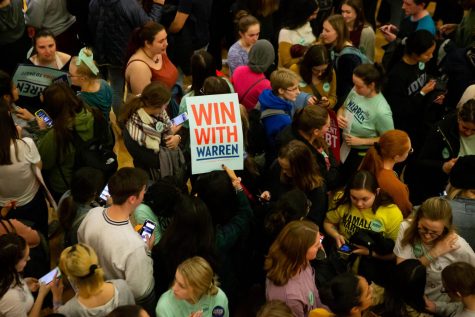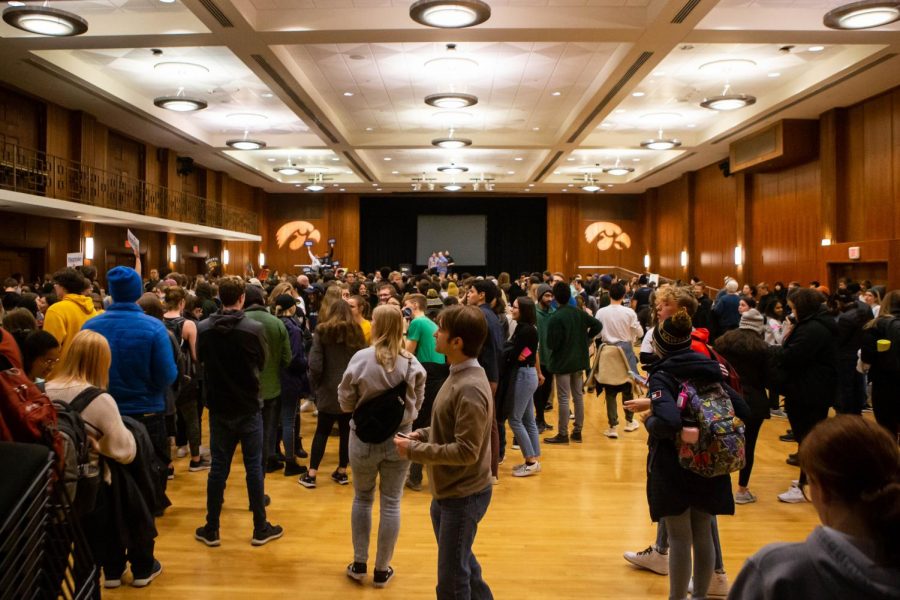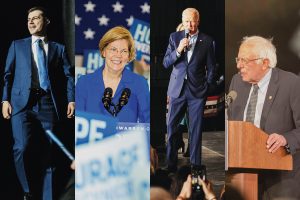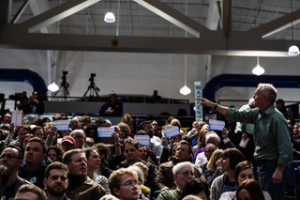First-time caucusgoers wade into murky waters of Iowa politics
Many students stated that ideological differences between factions of the Democratic Party influenced their decisions Monday night.
University of Iowa students caucus at the Iowa Memorial Union on Monday February 3, 2020.
February 4, 2020
As the nation trained its eyes on the Hawkeye State Monday night for the Iowa caucuses, many University of Iowa students were exposed to the oft raucous nature of the first-in-the-nation caucuses for the first time.
As colleges and universities throughout the state rallied behind their candidates of choice, the University of Iowa was no exception — throughout the night, thousands of students caucused for the 11 Democratic candidates and incumbent president alike. At the IMU, for example, students rallied heavily for Sen. Bernie Sanders, I-Vt., Sen. Elizabeth Warren, D-Mass., and Buttigieg.
Buttigieg supporter Abigail Bright said she is fond of the former mayor’s youth and charisma. Bright, a UI freshman and first-time caucusgoer, said she is hoping “Mayor Pete” leaves Iowa with a victory.
“I’ve done research about all the candidates online and read about them,” she said. “What I like about [Buttigieg] is his passion for younger generations. He understands us, and I just like him as a person, too.”
Although UI junior Ben Perez said he is the first to admit that former Vice President Joe Biden is not “the most enthusiastic” candidate running in the 2020 election, his storied career should speak for itself.
“I like his background as [President Obama’s] right-hand man,” Perez said. “I also like that his goals and policies are achievable, which I don’t think is being shown in other campaigns.”
At around 7:45 p.m., well into the first alignment of the evening, the lights of the IMU second floor ballroom went out. After a brief moment of panic, a litany of iPhone-powered flashlights illuminated the space — some campaigns, such as that of entrepreneur Andrew Yang, took the abbreviated blackout as an opportunity to engage with undecided voters.
One of these undecided voters, UI freshman Liam Warren, said he was not simply torn by “who I like the best,” but by the ideological divide between the moderate and progressive factions of the Democratic Party.
“At this point, I just really don’t know,” Warren said, adjusting his campaign button-clad leather jacket. “I’m torn between the … ideas that I view should be done, and the candidates whose platforms and policies can be done.”
To UI sophomore Ian Triplett, Sanders is the “clear choice” for the Democratic nomination. Even though Triplett said he understands the skepticism that prevents some Democrats from supporting Medicare for All and other progressive platforms, he added that now, more than ever, the nation is ready for a political revolution.

A sign for Sen. Elizabeth Warren, D-Mass. is seen during a caucus at the Iowa Memorial Union on Monday February 3, 2020.
“[The senator] cares about the lives of the people who have been negatively impacted by the system the most,” Triplett said. “I care about universal health care and education because those programs will help the people who have been disenfranchised the most.”
Across campus at Schaeffer Hall, students quietly talked to one another while filling out Republican preference-voting ballots. Of the students The Daily Iowan spoke with, all of them were freshmen — including Maddie Pautvein, a freshman who showed up to support the Republican Party.
“I decided I would give it a shot,” she said. “I’m a Republican so I thought I’d come to the Republican caucus first.”
According to data aggregated by Tufts University, college-aged caucusgoers (18-29) in Iowa demonstrated how Sanders, Warren, and former South Bend, Indiana Mayor Pete Buttigieg showed an early lead in Iowa. As of Jan. 24, Sanders held 39 percent of the prospective 18-29 vote, followed by Warren at 19 percent, and Buttigieg at 14 percent.
This showcases the results from Precinct 5 (the IMU second-floor ballroom), where Sanders received four delegates, followed by Warren with three and Buttigieg with two.
The poll, in which 500 Iowans were surveyed, stated that 72 percent of Iowa youth said they had been “personally contacted” by a campaign, party, or any other organization that supports political candidates — 82 percent of young Democrats responded yes to this question, followed by 75 percent of independent/unaffiliated voters, and 60 percent of young Republicans.
According to the same report, young voters are not overwhelmingly passionate about one particular topic — issues pertaining to sexual health, climate change, and the rising cost of higher education are salient to college-aged students. 18 percent said they were especially passionate about the environment, while 12 percent cited taxes as a primary concern.
In 2016, former Secretary of State Hillary Clinton narrowly won Iowa with 49.8 percent of the vote compared to Sanders’ 49.6 percent, making it the closest contest in Iowa’s history.
Looking forward, Triplett said he hopes the “revolution” Sanders has started continues all the way to 1600 Pennsylvania Ave.
“If you look back at candidates who have ‘played it safe,’ they never capture the momentum required to win,” he said. “We even saw this with the 2016 election. I think this year, the [Democratic] Party is fired up and ready to move forward.”






